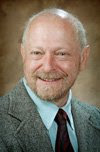One of the last century's most persistent urban legends is the supposed Atheism of two of its largest-scale mass murderers. Interestingly, this myth never took root in Poland, a country that suffered deeply under both Hitler and Stalin, perhaps because many Poles read Russian and German, and the older ones remember the two dictators' policies.
Hitler
Hitler consistently identified himself in his writings as a Christian, and a life-long Catholic. Before the Nazi party came into power, a faction led by Ernst Roehm successfully campaigned for the votes of German secularists, neo-Pagans and homosexuals. Hitler exterminated the top 61 leaders of this secularist faction in The Night of the Long Knives in 1934. Non-religious heterosexual Aryans were allowed to remain in the Nazi Party, but after 1934 the remaining Atheists had no political influence.
Germany's Churches, both Catholic and Protestant, and Catholic and Protestant religious parties, overwhelmingly supported Hitler, giving him special praise for his anti-abortion and anti-homosexual policies and for his "War Against Judeo-Bolshevism." Hitler repaid the favor, re-establishing state religions in previously secular conquered countries in Europe. Hitler created two new countries, Slovakia and Croatia, as Nazi satellites; both were established as Roman Catholic theocracies with Roman Catholic clergy at the head of their governments.
Purported "evidence" for Hitler's alleged Atheism comes mainly from "Hitler's Table Talk," a compendium "edited" by notorious pathological liar Martin Bormann. None of the supposed "documents" of Hitler's supposed "Atheism" has been reliably authenticated; most are demonstrably forgeries, fabricated long after their alleged dates.
Stalin
Joseph Stalin ("Party Name" of Yosip Dzhougashvili) had been a child prodigy whose religious poetry was celebrated by critics and widely published while he was still in his teens. Receiving a scholarship at 16, he chose to attend a seminary for future Orthodox Christian priests rather than a secular university. Shortly before his final exams, Dzhougashvili decided that the emerging Communist movement embodied Christian altruism more perfectly than the established Orthodox Christian Church, and became a Communist activist.
Arguments for Stalin's supposed Atheism hinge on the fact that he remained in the Communist Party during Lenin's brief anticlerical campaign (after the Orthodox Christian Church, which as an established church had played in Tzarist Russia a role analogous to that of the Communist Party in the subsequent Soviet regime, was dis-established and the Soviet State was made secular.) Stalin's one authenticated "Atheist" statement, from an extemporaneous speech ("You know, they are fooling us, there is no God...all this talk about God is sheer nonsense") dates from that period.
Once Lenin was dead, Stalin resumed his prior habit of making frequent mention of "God" and "God's will" in his speeches. Stalin consistently refused to include Atheist books in his library, calling them "antireligious waste-paper" ("Stalin's Secret Life," B. S. Ilizarov 2004.) While Stalin deported many priests to the Gulag during the Great Purge, the priests were mostly permitted to live - in contrast to (usually Atheist) "Old Bolsheviks," most of whom were tortured and killed.
According to pro-Stalin activists in the Russian Orthodox Church today, Stalin had a "born again" Christian spiritual experience in 1941, and remained a devout Christian, and was a devotee of the folk mystic St. Matryona of Moscow until his death. Convinced that the German invasion was divine punishment for the dis-establishment of the Orthodox Church and the imprisonment of its priests, Stalin not only released the few priests still imprisoned by 1941, but also re-established the Russian Orthodox Church as the official Church of the State; priests, monks, patriarchs and bishops were placed on Soviet state payroll and given privileges comparable to the privileges of members of the Communist Party.
In Soviet satellite states, such as Poland, local churches (such as the Roman Catholic Church in Poland) were given considerable political authority. For the first time in Polish history, attendance at lessons in the Catholic Catechism, taught by Catholic priests, was made mandatory in all government schools. (Before Stalin, these classes were optional, although in some schools dissenting students were kept in unheated hallways, even in the notorious cold of Polish winters, and many attended the catechism classes just to keep warm.) In the Soviet Union itself, persecution of believers and clergy was limited to sects and churches considered heretical by the Patriarchs of the Established Orthodox Church.
Post-Stalin, questions of religion and Atheism were delegated to the leaders of local Communist Parties, with extreme differences from country to country.
Tuesday, November 30, 2010
Subscribe to:
Post Comments (Atom)


1 comment:
Thank you for that information, Adam. I was aware of Hitler's admiration for the Catholic religion, but the information on Stalin was new to me.
Post a Comment